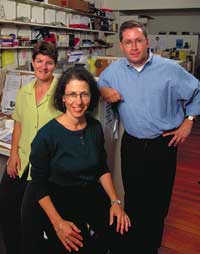![]()
Main Menu ·
Search ·
Current Issue · Contact · Archives · Centennial · Letters to the Editor · FAQs
![]()
Main Menu ·
Search ·
Current Issue · Contact · Archives · Centennial · Letters to the Editor · FAQs

After 18 months of intense but civil negotiating and arduous fact-finding, the University and the Harvard Union of Clerical and Technical Workers (HUCTW) were close to reaching agreement as this issue went to press on what caused and what to do about widespread--and in some cases apparently deliberate--misuse of part-time employees.
 After a long campaign, HUCTW has gained recognition from the University of casual workers' plight. At left, in their Massachusetts Avenue office, are union treasurer Donene Williams, president Adrienne Landau, and director Bill Jaeger. Photograph by Stu Rosner |
Under the HUCTW contract and Harvard's personnel procedures for nonunion employees, "casual" workers may be hired to work for as many as 17.5 hours per week for as long as three months. Any longer, and they are supposed to be eligible for regular employment, including benefits. "We do see a legitimate use for the casual payroll," says Bill Jaeger, HUCTW's director, citing as an example a temporary assignment to a computer-systems project. "Harvard is a flexible and fluid enough place, with wildly divergent circumstances in different parts of the University, to make it appropriate."
But, he explains, "based on accounts and observations from our members over time, we had concern that the use of the casual payroll had become quite extensive. There was confusion and even sloppiness in how the guidelines were being used," so HUCTW began discussing the issue with its University contacts. Union president Adrienne Landau says casual workers find it a "delicate matter" to raise their status with supervisors, because they can be dismissed easily.
Harvard vice president and general counsel Anne Taylor, who has led the negotiations for the University, says that attempts to gather data on the scope of the problem began in the fall of 1998, and became intense last spring, when Harvard and the union each formed four-person teams to investigate. Sorting through the records of the several thousand casual workers hired each year proved difficult, she said, because the employment rules are "administered and the records kept in the faculties," leading to "nonuniform application." Complicating the research, she says, are cases where casual workers complete an assignment, leave Harvard, and then return for another project. Nonetheless, she says, the data gathered show that "all schools are well represented in the noncompliance category," with acute problems in the larger, more decentralized schools such as Arts and Sciences, where casual workers are "hidden in more nooks and crannies," and in the libraries, where many casual workers are hired, for example, to shelve books. "It's a rule that's easy to run afoul of," she says, while also conceding that "there are incentives to run afoul of it because it's cheaper" to hire casual employees.
Jaeger delicately phrases the issue this way: "There are certainly lots of pockets, some of them big ones, where there is a pattern of usage that would make it appear that managers were taking advantage of that permissive system to make extensive use of the casual payroll--when they must have known there were policies against it--to save money." In many cases, he notes, the rules were broken "marginally," by a few days or weeks. But he says there were "really horrendous situations" as well, where workers remained in casual status for as long as a decade. Disproportionately represented in those ranks, he says, according to anecdotal evidence, were the most vulnerable workers--members of minority groups, immigrants, or people not fluent in English.
HUCTW's chief objectives in the negotiations, Jaeger and Landau say, were to secure regular employment for workers who have been on casual status for the longest terms, and compensation for the benefits to which they should have been entitled. "Those jobs have to be done," says Donene Williams, the union's treasurer and past president, "and the people who have been doing them are entitled to appropriate compensation if they continue to do them." The real challenge, she adds, "is changing the minds and behavior of thousands of supervisors--something that's not been done University-wide" in the past.
Beyond correcting past abuses, Taylor says the University will undertake several steps to prevent any recurrence. There will "definitely be improvements in monitoring" as modern payroll and administrative systems are installed as part of Project ADAPT. In addition, she says, the negotiations and fact-finding have "shaken people up, at least temporarily," as awareness spreads about the misuse of casual labor and the legal implications of violating contracts. Finally, she says, in the bargaining before a new Harvard-HUCTW contract in 2001, the University will seek new rules on casual work that are easier to comply with and administer.
For now, confronting the casual-employment issue has improved relations on both sides. During final negotiations, Jaeger praised Taylor for "real leadership and real negotiating skill." Despite evidence that there had been "some manipulation and exploitation of the casual system," he said he felt "very good about having made this much progress and about how responsible and creative some of the University leaders are being." For her part, Taylor said of the union negotiators: "They've been terrific."
Main Menu ·
Search · Current Issue · Contact · Archives · Centennial · Letters to the Editor · FAQs
![]()